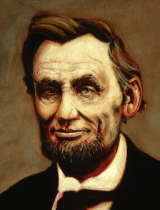
1809 Abraham Lincoln is born in a one-room cabin in Kentucky
1832 Lincoln becomes a candidate in a failed bid for the Illinois General Assembly
1858 Abraham Lincoln delivers his House Divided speech in Springfield, Illinois.
1858 First of the Lincoln-Douglas debates in which Lincoln debates Stephen Douglas during a campaign for the U.S. Senate.
1860 Abraham Lincoln makes a speech at Cooper Union in the city of New York that is largely responsible for his election to the Presidency.
1860 Abraham Lincoln wins the Republican Party presidential nomination over William H. Seward, who later becomes the United States Secretary of State.
1861 President-elect Abraham Lincoln arrives secretly in Washington, D.C., after the thwarting of an alleged assassination plot in Baltimore, Maryland.
1861 President of the United States Abraham Lincoln suspends the writ of ''habeas corpus''.
1861 American Civil War: at the order of President Abraham Lincoln, Union troops begin a 25 mile march into Virginia for what will become The First Battle of Bull Run, the first major land battle of the war.
1861 U.S. President Abraham Lincoln suspends the writ of ''habeas corpus'' in Washington, D.C., for all military-related cases.
1861 American Civil War: US President Abraham Lincoln appoints George B. McClellan as the commander of the Union Army, replacing the aged General Winfield Scott.
1861 Medal of Honor: Public Resolution 82, containing a provision for a Navy Medal of Valor, is signed into law by President Abraham Lincoln.
1862 President Abraham Lincoln signs a bill into law creating the United States Bureau of Agriculture. It is later renamed the United States Department of Agriculture.
1862 U.S. President Abraham Lincoln signs the Homestead Act into law.
1862 American Civil War: President Abraham Lincoln reluctantly restores Union General George B. McClellan to full command after General John Pope's disastrous defeat at the Second Battle of Bull Run.
1862 American Civil War: Abraham Lincoln removes George B. McClellan as commander of the Union Army for the second and final time.
1862 American Civil War: President Abraham Lincoln approves General Ambrose Burnside's plan to capture the Confederate capital at Richmond, Virginia, leading to the Battle of Fredericksburg.
1862 American Civil War: Abraham Lincoln signs an act that admits West Virginia to the Union, thus dividing Virginia in two.
1863 U.S. President Abraham Lincoln signs the National Currency Act into law.
1863 The last Thursday in November is declared as Thanksgiving Day by President Abraham Lincoln as are Thursdays, November 30, 1865 and November 29, 1866.
1863 American Civil War: U.S. President Abraham Lincoln delivers the Gettysburg Address at the dedication of the military cemetery ceremony at Gettysburg, Pennsylvania.
1864 U.S. President Abraham Lincoln grants Yosemite Valley to California for "public use, resort and recreation".
1864 In his State of the Union Address President Abraham Lincoln reaffirms the necessity of ending slavery as ordered ten weeks earlier in the Emancipation Proclamation.
1865 President Abraham Lincoln signs the Thirteenth Amendment to the United States Constitution.
1865 American Civil War: A day after Union forces capture Richmond, Virginia, U.S. President Abraham Lincoln visits the Confederate capital.
1865 President Abraham Lincoln makes his last public speech.
1865 U.S. President Abraham Lincoln is assassinated in Ford's Theatre by John Wilkes Booth.
1865 Abraham Lincoln dies without regaining consciousness after being shot the previous evening by actor John Wilkes Booth.
1865 Mary Surratt is arrested as a conspirator in the assassination of Abraham Lincoln.
1865 American Civil War: four conspirators in the assassination of President Abraham Lincoln are hanged.

